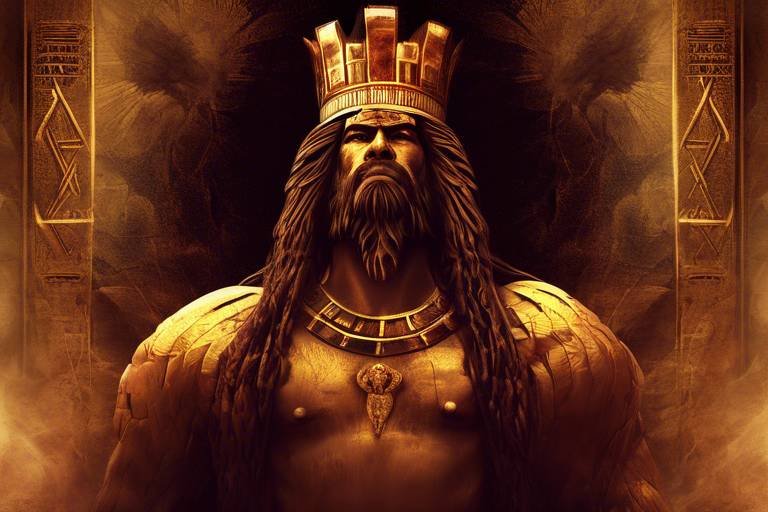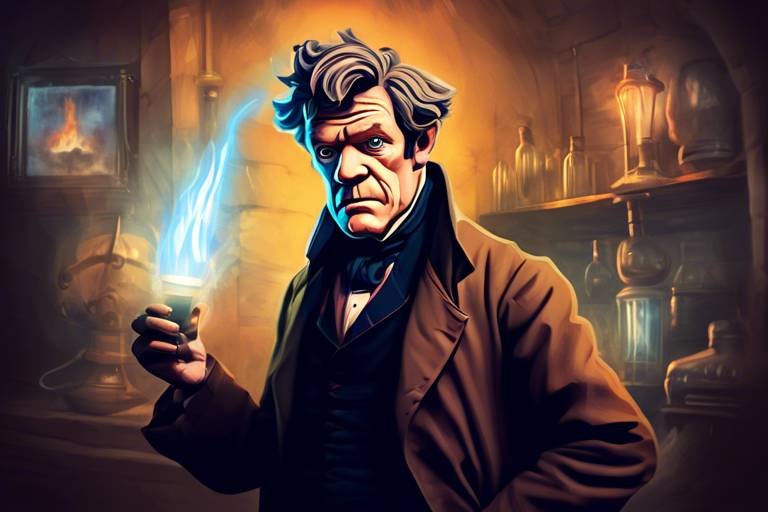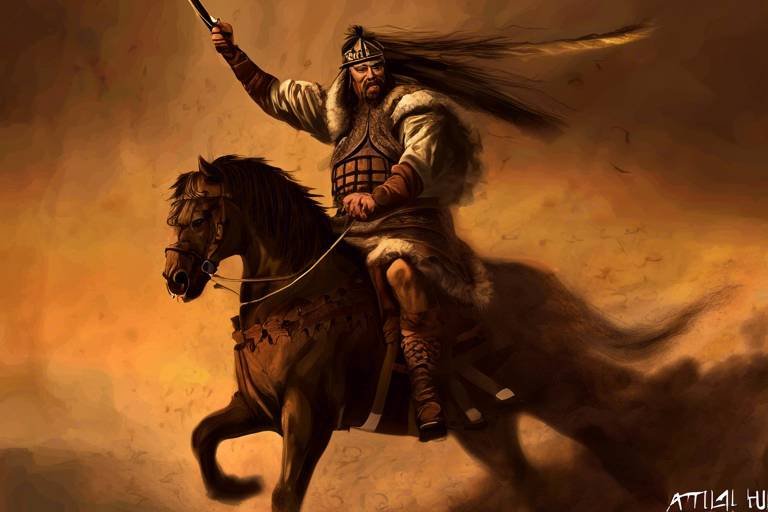Nebuchadnezzar: The King of Babylon
Known as one of the most formidable rulers in ancient Babylonian history, Nebuchadnezzar stands out as a figure of immense power and influence. His reign was marked by a series of military conquests, architectural marvels, and cultural advancements that shaped the course of the Babylonian Empire.
From his early days to the pinnacle of his rule, Nebuchadnezzar's journey to becoming the King of Babylon was filled with intrigue and ambition. His upbringing, family background, and the events that led to his coronation all played a crucial role in shaping his character and leadership style, setting the stage for his legendary reign.
One of the defining aspects of Nebuchadnezzar's legacy was his prowess in military campaigns and conquests. His strategic warfare tactics, including the famous siege of Jerusalem and the conquest of Egypt, solidified his reputation as a formidable warrior and a skilled diplomat, expanding the boundaries of the Babylonian Empire.
Among his many achievements, Nebuchadnezzar's architectural legacy shines brightly, most notably through the creation of the legendary Hanging Gardens of Babylon. These gardens, considered one of the Seven Wonders of the Ancient World, showcased his grand vision and engineering expertise, leaving a lasting mark on history.
Religion also played a significant role in Nebuchadnezzar's rule, with his patronage of Babylonian gods and the intertwining of religious beliefs in governance. The divine aspect of his reign reflected the deep-rooted importance of religion in ancient Mesopotamian society, shaping the cultural fabric of Babylon.
Furthermore, Nebuchadnezzar's contributions to Babylonian culture were vast and enduring. His support for advancements in art, literature, and science ushered in a golden age of civilization, leaving a profound impact on future generations and influencing the development of ancient societies.
However, as with many rulers, Nebuchadnezzar faced challenges towards the later years of his reign. Struggles with illness, succession issues, and internal conflicts ultimately led to his decline in power and the eventual end of his rule, marking a significant transition in Babylonian history.
Despite the passage of time, Nebuchadnezzar's legacy continues to resonate in historical records, literature, and popular culture. His reign remains a subject of fascination for scholars and enthusiasts worldwide, symbolizing an era of greatness and complexity in the ancient world.

Early Life and Ascension to the Throne
Exploring the life and reign of Nebuchadnezzar, one of the most powerful and significant rulers in ancient Babylonian history, known for his military conquests, architectural achievements, and contributions to the empire's cultural development.
From humble beginnings to the pinnacle of power, Nebuchadnezzar's journey is a tale of ambition and destiny. Born into the royal family of Babylon, his early life was marked by intrigue and rivalry as he navigated the complex dynamics of court politics. Despite facing challenges and obstacles, Nebuchadnezzar's determination and strategic acumen set him apart, earning him the respect and loyalty of his people.
His ascension to the throne was a defining moment in Babylonian history. The coronation ceremony, steeped in tradition and symbolism, solidified his authority and signaled a new era of prosperity and stability for the empire. As the young king took his place on the throne, the realm awaited the dawn of a reign that would shape the course of history.

Military Campaigns and Conquests
Exploring the life and reign of Nebuchadnezzar, one of the most powerful and significant rulers in ancient Babylonian history, known for his military conquests, architectural achievements, and contributions to the empire's cultural development.
Details of Nebuchadnezzar's upbringing, his family background, and the events leading to his coronation as the King of Babylon, shaping his character and leadership style.
Nebuchadnezzar's reign was marked by a series of successful military campaigns that solidified his power and expanded the Babylonian Empire. His strategic warfare tactics and diplomatic skills enabled him to conquer vast territories and establish Babylon as a dominant force in the ancient world.
One of Nebuchadnezzar's most notable military achievements was the siege of Jerusalem, where he captured the city and deported the Jewish population to Babylon. This event had far-reaching consequences and reshaped the political landscape of the region.
In addition to his conquest of Jerusalem, Nebuchadnezzar also undertook successful campaigns in Egypt, further extending Babylonian influence in the region. His military prowess and ability to navigate complex geopolitical situations earned him a reputation as a formidable ruler.
Exploration of the legendary Hanging Gardens of Babylon, one of the Seven Wonders of the Ancient World, attributed to Nebuchadnezzar's grand architectural vision and engineering prowess.
Insight into Nebuchadnezzar's religious beliefs, his patronage of Babylonian gods, and the role of religion in his rule, highlighting the significance of divinity in ancient Mesopotamian society.
Discussion on Nebuchadnezzar's cultural impact, including advancements in art, literature, and science, fostering a golden age of Babylonian civilization that influenced future generations.
Analysis of the factors leading to Nebuchadnezzar's decline in power, his struggles with illness and succession issues, and the eventual end of his reign, marking the conclusion of an era in Babylonian history.
Reflection on Nebuchadnezzar's enduring legacy in historical records, literature, and popular culture, examining how his reign continues to captivate scholars and enthusiasts worldwide.

Architectural Legacy: The Hanging Gardens
When it comes to architectural marvels of the ancient world, Nebuchadnezzar's Hanging Gardens stand out as a testament to grandeur and ingenuity. These gardens, often referred to as one of the Seven Wonders of the Ancient World, were a lush oasis in the heart of Babylon, showcasing the king's dedication to creating a breathtaking spectacle.
Legend has it that Nebuchadnezzar built the Hanging Gardens for his wife, Amytis of Media, who longed for the green hills and valleys of her homeland. Rising tier upon tier, the gardens were a symphony of colors and fragrances, with exotic plants and flowers cascading down terraces like a living tapestry.
The engineering behind the Hanging Gardens was a marvel in itself. To sustain such a lush paradise in the arid Mesopotamian landscape, an intricate system of irrigation channels was devised. Water was drawn from the Euphrates River and lifted to the gardens through a series of pumps and aqueducts, ensuring a constant flow to nourish the flora.
Visitors to the Hanging Gardens were said to be awe-struck by the sight of towering trees, blooming flowers, and flowing streams, all set against the backdrop of the bustling city of Babylon. The gardens not only served as a testament to Nebuchadnezzar's wealth and power but also as a symbol of his love and devotion.
While the exact location and existence of the Hanging Gardens have been a subject of debate among historians and archaeologists, their legacy endures as a symbol of human creativity and the desire to create beauty amidst the chaos of the world.

Religious Beliefs and Practices
Nebuchadnezzar's reign in Babylon was deeply intertwined with his religious beliefs and practices, shaping both his personal life and his rule over the empire. As a devout follower of Babylonian gods, Nebuchadnezzar displayed a strong commitment to honoring and appeasing these deities through elaborate rituals and ceremonies. His patronage of the main Babylonian gods, such as Marduk, symbolized his divine mandate as the ruler of Babylon, reinforcing his authority and legitimacy in the eyes of the people.
Moreover, religion played a central role in Nebuchadnezzar's decision-making process, with divination and oracles often consulted before major military campaigns or important policy decisions. The belief in the gods' influence on earthly affairs guided Nebuchadnezzar's actions, leading him to seek their favor through offerings and sacrifices. This religious fervor not only influenced his personal conduct but also permeated the administrative and judicial systems of the Babylonian Empire, imbuing them with a sense of divine justice and order.
One of the most notable instances of Nebuchadnezzar's religious practices was his construction of the grandiose ziggurat known as the Etemenanki, dedicated to the god Marduk. This monumental structure served as a physical manifestation of Nebuchadnezzar's piety and devotion, showcasing his commitment to the Babylonian pantheon. The Etemenanki stood as a symbol of Babylon's spiritual and political centrality, reinforcing the city's status as a divine hub and Nebuchadnezzar's role as the chosen intermediary between gods and mortals.
In addition to his religious observance, Nebuchadnezzar also engaged in acts of cultural preservation and promotion, sponsoring the restoration of ancient temples and the revival of traditional religious practices. By investing in the upkeep of sacred sites and the celebration of religious festivals, Nebuchadnezzar sought to maintain the spiritual cohesion of Babylonian society and ensure the continued support of the gods in his endeavors.

Cultural Contributions and Legacy
Nebuchadnezzar's cultural contributions and legacy are deeply intertwined with the flourishing of Babylonian civilization during his reign. His patronage of the arts, literature, and sciences ushered in a golden age that left an indelible mark on the empire's cultural landscape. Through his support and promotion of artistic endeavors, Nebuchadnezzar fostered a vibrant creative environment that attracted scholars, poets, and artisans from far and wide, enriching Babylonian society with a diverse array of cultural expressions.
One of the most notable cultural achievements attributed to Nebuchadnezzar is the development of Babylonian literature, which saw a renaissance under his rule. Epic poems, historical chronicles, and religious texts flourished, reflecting the rich tapestry of Babylonian life and beliefs. The royal court became a hub of intellectual activity, where scribes and scholars gathered to exchange ideas, preserve knowledge, and create enduring works that would shape the literary legacy of the empire for generations to come.
Furthermore, Nebuchadnezzar's support for scientific inquiry and technological innovation propelled Babylon to the forefront of ancient civilization. The empire's astronomers made groundbreaking discoveries in the field of celestial observation, mapping the movements of the stars and planets with remarkable accuracy. Meanwhile, advances in mathematics and engineering led to the construction of awe-inspiring architectural marvels, such as the famed Hanging Gardens of Babylon, a testament to Nebuchadnezzar's vision and ambition.
Moreover, Nebuchadnezzar's cultural legacy extended beyond the borders of Babylon, influencing neighboring regions and future civilizations. The artistic and intellectual achievements of his reign served as a beacon of inspiration for later societies, shaping the development of art, literature, and science in the ancient world. Even today, the echoes of Nebuchadnezzar's cultural contributions reverberate through the annals of history, reminding us of the enduring impact of a ruler whose legacy transcends time.

Decline and End of Reign
As Nebuchadnezzar's reign progressed, his once mighty empire began to show signs of decline. The formidable ruler faced various challenges that would ultimately lead to the end of his powerful reign. One significant factor contributing to Nebuchadnezzar's decline was his deteriorating health. Historical accounts suggest that he suffered from a mysterious illness, which greatly weakened his ability to govern effectively. This physical ailment not only impacted his personal well-being but also cast a shadow of uncertainty over the future of Babylon.
Furthermore, succession issues emerged as a pressing concern during the latter years of Nebuchadnezzar's rule. The question of who would inherit the throne and lead the Babylonian Empire loomed large, creating internal strife and power struggles within the royal court. The lack of a clear and stable succession plan added to the instability of the empire, paving the way for potential conflicts and political turmoil.
Amidst these challenges, Nebuchadnezzar's grip on power began to loosen, marking a stark contrast to his earlier years of military conquests and cultural achievements. The once invincible king found himself grappling with internal dissent and external threats, further hastening the decline of his once-mighty empire. As the end of his reign drew near, Nebuchadnezzar's legacy hung in the balance, with the fate of Babylon hanging in the balance.

Historical Significance and Modern Perceptions
Exploring the life and reign of Nebuchadnezzar, one of the most powerful and significant rulers in ancient Babylonian history, known for his military conquests, architectural achievements, and contributions to the empire's cultural development.
Nebuchadnezzar's legacy extends far beyond his time, leaving an indelible mark on history that continues to intrigue scholars and enthusiasts worldwide. His reign, marked by military prowess and cultural advancements, has been a subject of fascination for generations.
Modern perceptions of Nebuchadnezzar often vary, with some viewing him as a ruthless conqueror driven by ambition, while others admire his strategic acumen and patronage of the arts. His architectural feats, particularly the Hanging Gardens of Babylon, have captured the imagination of many, symbolizing the grandeur and innovation of ancient Babylonian civilization.
Historically, Nebuchadnezzar's reign is seen as a pivotal period in Babylonian history, characterized by both prosperity and conflict. His military campaigns reshaped the political landscape of the ancient Near East, solidifying Babylon's status as a dominant power in the region.
Moreover, Nebuchadnezzar's cultural contributions, including advancements in literature, art, and science, laid the foundation for a flourishing period of Babylonian civilization. His patronage of the arts and promotion of intellectual pursuits fostered a climate of creativity and innovation that reverberated throughout the empire.
While his rule eventually came to an end, Nebuchadnezzar's impact endured through the ages, influencing subsequent generations and leaving a lasting imprint on the cultural fabric of Mesopotamia. His legacy continues to be studied and celebrated, offering valuable insights into the complexities of ancient Babylonian society and the enduring allure of its legendary king.
Frequently Asked Questions
- Who was Nebuchadnezzar?
Nebuchadnezzar was a powerful and significant ruler in ancient Babylonian history, known for his military conquests, architectural achievements, and cultural contributions to the empire.
- What were some of Nebuchadnezzar's major military campaigns?
Nebuchadnezzar led successful military campaigns such as the siege of Jerusalem, conquest of Egypt, and strategic expansion of the Babylonian Empire through warfare and diplomacy.
- What is Nebuchadnezzar's architectural legacy?
Nebuchadnezzar is famously associated with the legendary Hanging Gardens of Babylon, considered one of the Seven Wonders of the Ancient World, showcasing his grand architectural vision and engineering skills.
- How did religion influence Nebuchadnezzar's rule?
Religion played a significant role in Nebuchadnezzar's reign, as he was a patron of Babylonian gods and his rule was deeply intertwined with religious beliefs, reflecting the importance of divinity in ancient Mesopotamian society.
- What was Nebuchadnezzar's cultural impact?
Nebuchadnezzar made significant contributions to Babylonian culture, fostering advancements in art, literature, and science that led to a golden age of civilization, influencing future generations and leaving a lasting legacy.
- How did Nebuchadnezzar's reign come to an end?
Nebuchadnezzar faced challenges towards the end of his reign, including struggles with illness and succession issues, ultimately leading to the decline of his power and the conclusion of his era in Babylonian history.
- What is Nebuchadnezzar's historical significance?
Nebuchadnezzar's reign has left a lasting impact on historical records, literature, and popular culture, continuing to captivate scholars and enthusiasts worldwide with his enduring legacy and contributions to ancient history.



















